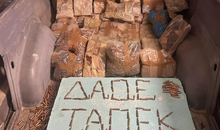
 Flash News
Flash News
Accident at "Shkalla e Tujanit", truck overturns in the middle of the road, driver injured
Vlora by-pass, work delays and cost increases
Milan are expected to give up on the transfer of Granit Xhaka
Inceneratori jashtë funksionit, përfshihet nga flakët fusha e mbetjeve në Elbasan
Accident on the Lezhë-Shëngjin axis, one injured

Kleo Chestnuts *
Concession contracts are by no means unknown to the Albanian public procurement authorities. As of January 2021, there are a total of 221 concession contracts in various sectors in Albania; as in energy, infrastructure, health, and services. To have a clearer idea, a concession is a contractual relationship that gives a certain company the right to operate and invest in a specific sector under state jurisdiction, subject to the laws and terms under the contract. Although the idea of a concession has been sold as an increase in efficiency in providing a service, a number of cases of corrupt concessions have been identified, not only in Albania but also in Europe.
In Albania, there is an increase in the number of concessions in infrastructure, health, and services which surprisingly have direct funding from the state budget. From 2014 until today, we can mention the incinerators concessions, the health concessions, the concessions for the maintenance of the National Road, the construction of the Milot-Balldren axis, the construction of the Arbri Road, and the Orikum-Dukat segment. Concessions in construction and road maintenance alone will cost the state budget a whopping 1.2 billion euros. Whereas, incinerators only for 2021 are expected to absorb from the state budget a full 2.2 billion ALL. The last concession of the Rama government was the one for the control of the fuel pumps which will cost the Albanian state approximately 100 million euros for a period of 20 years. Not surprisingly,
An analysis made against these concessions reveals some common concerns that are:
- Lack of competition
- Lack of participation of foreign companies
- Lack of money value analysis
- Winning companies registered in tax havens
- Contracts that totally favor private companies
- Companies closely related to power
- Unsolicited concession offers
The problem with concessions is noticed in the initial stages, one of which is the tendering process. In all cases, legal specifications are made with the tendency to exclude foreign companies and thus enable the predetermination of the winning company. The most recent case was that of the concession for the control of fuel pumps. In more than one case, tendering procedures were suspended and reopened due to procedural and legal violations, such as the Thumanë-Kashar axis, which the government failed to procure. Concession offers are often unsolicited, so projects are not part of the country's strategic development package. Here we can list the concession for 3 incinerators in Tirana, Fier, and Elbasan. These unsolicited offers,
The shadows of doubt become even greater if the companies that win concession contracts are analyzed. The companies that have submitted unsolicited bids for the three incinerators are registered in tax havens and are companies created only in recent years and have no experience at all in the sector in which they operate. The legal executives of these companies turn out to be individuals without professional experience, without experience in the management of private entities, and no longer in the management of complex concession contracts of hundreds of millions of euros. Naturally, there is a doubt as to who is really hiding behind these companies. In infrastructure concessions, mainly in road construction, the winning companies are closely linked to the government. As is the case in other countries with high corruption such as Albania,
The first test for the Basha government after the elections will be the attitude towards these concessions which burden the state budget a lot. Will the DP leadership have the capacity and determination to fight this phenomenon? Will the government have the human resources to increase the quality of institutions that procure, audit, and supervise concessions? Will the next parliament be able to cancel these contracts without facing fines from international arbitration courts? Will the new justice institutions and the press be able to investigate these dubious contracts? Will the new government be able to draft a package of laws on concessions aimed at curbing corruption, lobbying, conflict of interest, and political influence?
Not necessarily, a positive answer to these questions will eliminate the influence on concession contracts. However, the implementation of new procedures in the procurement of concessions and the investigation by the judiciary of past concessions would reduce the political impact, increase the transparency and efficiency of these contracts. Experience in other developing countries such as Albania has shown that only by taking such steps can corruption be reduced and the efficiency of concession contracts increased.
*MSc Construction Economics and Management-University College London
Latest news








Golem and Qerret without water at the peak of the tourist season
2025-07-01 21:09:32

Euractiv: Italy-Albania migrant deal faces biggest legal challenge yet
2025-07-01 20:53:38
BIRN: Brataj and Fevziu victims of a 'deepfake' on Facebook
2025-07-01 20:44:00

Vlora by-pass, work delays and cost increases
2025-07-01 20:24:29



Milan are expected to give up on the transfer of Granit Xhaka
2025-07-01 19:41:25


The silent but rapid fading of the towers' euphoria
2025-07-01 18:58:07
Donald Trump's daughter says 'goodbye' to June with photos from Vlora
2025-07-01 18:48:47

Tirana vote recount, Alimehmeti: CEC defended manipulation
2025-07-01 18:15:05

Left Flamurtari, striker signs with another Albanian club
2025-07-01 17:43:14
Accident on the Lezhë-Shëngjin axis, one injured
2025-07-01 17:19:35
June temperature records, Italy limits outdoor work
2025-07-01 17:03:15

Meet Kozeta Miliku, named one of the top five scientists in Canada
2025-07-01 16:32:12
"Arsonist" arrested for repeatedly setting fires in Vlora (NAME)
2025-07-01 16:29:45

The ecological integrity of the Vjosa River risks remaining on paper
2025-07-01 16:09:40
Heat Headache/ Causes, Symptoms and Measures You Should Take
2025-07-01 16:01:13
UN: The world must learn to live with heat waves
2025-07-01 15:54:50

Three cars collide in Tirana, one of them catches fire
2025-07-01 15:38:16

Shehu: Whoever doesn't want Berisha, doesn't want the opposition 'war'!
2025-07-01 15:19:20
Berisha requests the OSCE Assembly: Help my nation vote freely
2025-07-01 15:11:46
Be careful with medications: Some of them can harm your sex life
2025-07-01 15:00:32

'Golden Bullet'/ Lawyers leave the courtroom, Altin Ndoc's trial postponed again
2025-07-01 14:44:52
EU changes leadership, Kosovo in a number of places
2025-07-01 14:40:01
Should we drink a lot of water? Experts are surprised: You risk hyponatremia
2025-07-01 14:30:20



Lëpusha beyond Rama's postcards: A village that is being silently abandoned
2025-07-01 13:41:56
Scorching temperatures in France close the Eiffel Tower
2025-07-01 13:29:35
Media: China, Iran and North Korea, a threat to European security
2025-07-01 13:20:12
Albania drops in global index: Less calm, more insecure
2025-07-01 13:09:35
Road collapses, 5 villages in Martanesh risk being isolated
2025-07-01 13:03:04

Këlliçi: Opposition action to be decided in September
2025-07-01 12:48:49
Four tips for coping with the heat wave
2025-07-01 12:38:53
Car hits pedestrian on Transbalkan road
2025-07-01 12:27:09
Authors of 9 robberies, Erjon Sopoti and Abdullah Zyberi arrested
2025-07-01 12:15:56

He abused his minor daughter, this is a 36-year-old man in custody in Fier
2025-07-01 11:50:34
The constitution of the Kosovo Assembly fails for the 40th time
2025-07-01 11:40:08




EU confirms support for the Western Balkans
2025-07-01 10:50:45
Serious in Fier! Father sexually abuses his minor daughter
2025-07-01 10:32:33
One year since the passing of the colossus of Albanian literature, Ismail Kadare
2025-07-01 10:25:26


They supplied the 'spaçators' with drugs, two young men are arrested in Tirana
2025-07-01 09:54:09
Europe is "scorching", how dangerous are high temperatures?
2025-07-01 09:48:56


Nigel Farage in Albania: but why?
2025-07-01 09:13:12
Xama: The "Partizani" dossier is quite weak and without facts!
2025-07-01 09:04:47

Foreign exchange, the rate at which foreign currencies are sold and bought
2025-07-01 08:35:39
Fabricators again warn of factory closures and job cuts
2025-07-01 08:21:30
Horoscope, what do the stars have in store for you today?
2025-07-01 08:08:59
Scorching hot, temperatures reaching 40°C
2025-07-01 07:57:12
Morning Post/ In 2 lines: What mattered yesterday in Albania
2025-07-01 07:42:59
Recount after May 11, Braho: I had no expectations for massive vote trafficking
2025-06-30 22:54:18

Second hearing on the protected areas law, Zhupa: Unconstitutional and dangerous
2025-06-30 22:18:46



Israel-Iran conflict, Bushati: Albanians should be concerned
2025-06-30 21:32:42

Fuga: Journalism in Albania today in severe crisis
2025-06-30 21:07:11
"There is no room for panic"/ Moore: Serbia does not dare to attack Kosovo!
2025-06-30 20:49:53

Temperatures above 40 degrees, France closes nuclear plants and schools
2025-06-30 20:28:42
Lavrov: NATO is risking self-destruction with new military budget
2025-06-30 20:13:54
Turkey against the "Bektashi state" in Albania: Give up this idea!
2025-06-30 20:03:24

Accused of sexual abuse, producer Diddy awaits court decision
2025-06-30 19:40:44


